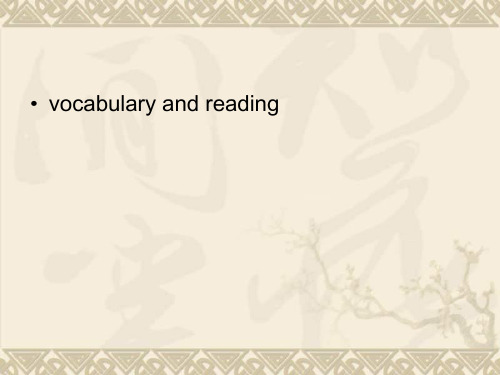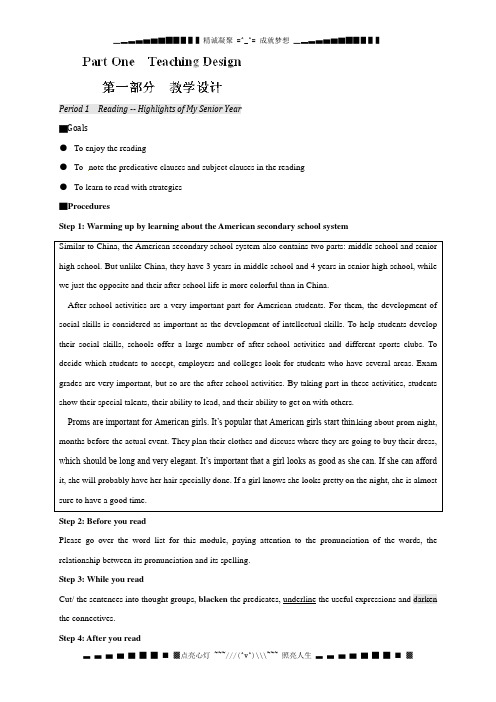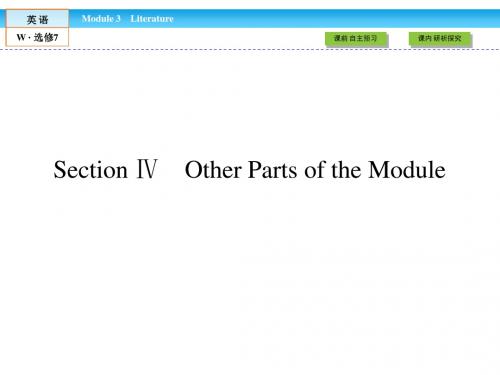陕西省南郑中学高中英语外研版选修7课件:M2P3 Language Points
陕西省某二中高二英语课件vocabulary and reading (2)(外研版选修7)

1. Mastering the words and phrases in the text. 2. Understanding the text and finding out the main idea of the text. 3. How to use the social skills in communication
2.Scanning
The general idea: social skills It This passage is about_________. tells us how to have a small talk and how to develop the listening skills; and when we go to a social occasion, we should pay attention social rules in different countries. to_________
1. an English teaching book
2. a business course
3. a book which tells you what to do at social events
4. a book to help you prepare for a speaking examination
2). According to the passage, which skill do most people lack during communication? A. Listening. B. Speaking. C. Body language. D. Eye contact. 3). If you want to impress people, you’d better not do the following things EXCEPT ____. A. use encouraging noises and gestures, and occasionally ask for more information to show your interest. B. look at your watch frequently. C. talk too much about yourself. D. change the subject or finish other people’s sentences for them.
陕西省南郑中学高中英语外研版选修7课件:M6 The World’s Cultural Heritage P3 Language Points

汉译英
1. 我和邻居保持友好。
I maintain friendly relations with my
neighbours.
2. 警察来了维持秩序。 Police were sent for to maintain order.
3. recommend vt. a. 推荐; 介绍 recommend sth. to sb./recommend sb. sth. 向某人推荐 Would you recommend a good book to me? = Would you recommend me a good book? 你能给我推荐一本好书吗?
II. 根据汉语提示,完成句子。
⑴ A proper amount of exercise
_______________________ contributes to good health (有益健康).
⑵ He has ___________________________ made great contributions to (有很大贡献) the development of a space program. ⑶ Older people are ____________________ important contributors
外研新标准 第七册 选修7
M6
Language Points
Language points课时是对Reading课时的 补充。帮助学生巩固课文重点词汇、短语和 句型的用法,进一步扎实基础知识。教师可 根据学生预习情况选择性讲解。 (词汇的释义和用法,建议引导学生自行 查找字典等相关资料来学习,以培养其自主 学习能力。) 词汇讲解,建议采用归纳法,先尽可能多 的呈现一些相关例句,或让学生从已学课文 中查找相应例句,引导学生试着从所观察到 的语言现象中总结出词汇的意思和用法。
陕西省南郑中学高中英语外研版选修7课件M3LiteratureP4Grammar

3. It took ten days of walking for them to reach London. Only after _t_e_n_d__a_y_s_d_id__t_h_e_y_r_e_a_c_h__ L__o_n_d_o_n_._
4. He had hardly ever known such kindness. Seldom _h_a_d__h_e_k_n__o_w_n__su__ch__k_i_n_d_n_e_s_s._
Neither have I. 2) He didn’t find any useful material in
the book. Nor did I.
注: word 文档 点击此处链接
Individual activity
句型转化,每空一词。
• Although she listened carefully, she • didn’t catch a word. → _C_a_r_e_fu_l_l_y_ _a_s/_t_h_o_u_g_h_ s_h_e_ _li_s_te_n_e_d_, she
the girl. 4. 当介词短语在句首时。 1) In front of the old house sat an
old woman. 2) On the top of the mountain
stands Leabharlann tower.部分倒装1. only所修饰的副词、介词短语或状语从 句放在句首时。
1) Only then did he know that he was rejected by the boss.
但如果主语是人称代词时,不用倒装。 如:Here it is.
Down it dropped.
陕西省南郑中学高中英语:Module 2 Highlights of My Senior Year 第一部分 教学设计(外研版选修7)

Period 1 Reading -- Highlights of My Senior Year▇Goals●To enjoy the reading●To note the predicative clauses and subject clauses in the reading●To learn to read with strategies▇ProceduresStep 1: Warming up by learning about the American secondary school systemProms are important for American girls. It’s popular that American girls start thin king about prom night,Step 2: Before you readPlease go over the word list for this module, paying attention to the pronunciation of the words, the relationship between its pronunciation and its spelling.Step 3: While you readCut/ the sentences into thought groups, blacken the predicates, underline the useful expressions and darken the connectives.Step 4: After you read1. Copy all the useful expressions into your Expression Book. If possible, make your own sentences with these expressions.dip loma2. Drawing a diagram of the text to show its organizationHighlights of My Senior Year↓One of the best things about this year has been working as an arts editor for this newspaper.↓↓During the Easter vacation, I went on a short school skiing trip to the Rocky Mountains.↓↓Step 5: Closing up by retelling the textTo end this period we are going to retell the text with the help of the diagram above , using as many predicative and subject clauses as possible.Period 2 Function -- Expressing thoughts and opinions▇Goals●To learn to express thoughts and opinions properly▇ProceduresStep 1: Learning how to express thoughts and opinionsThere are many ways to express thoughts and opinions. We often say “In my opinion...” “It seems to me that...” “I feel...” “I find it interesting /amusing/strange that...”. Actually, we have many other expressions for this, like “In my view” “As far as I’m concerned” “As I see it” “My feeling is that...”. Here are some sentences.1. In my opinion, our paper’s too short.2. As far a s I’m concerned, our paper is as perfect as it is.3. As I see it, it could be a bit longer.4. In my view, we need a new editor.5. It seems to me that he’s very good at his job.6. I find it strange that we’re al l arguing!7. My feeling is that we should stop arguing and have a cup of tea.Step 2: PracticeTake turns to give an opinion about the students’ after-school activitiesStep 3: Closing down by listing common expressions for feelings and thoughtsPeriod 3 Grammar -- Predicative clauses and subject clauses ▇Goals●To learn about the predicative clauses and subject clauses■ProceduresStep 1: Learning about predictive clauses and subject clauses1. Subject clause: The clause is used as a subject of the main verb. Subject clauses begin with that, if, whether, who, what, which, when, where, how, why, whoever, whichever, etc.Examples:1)Why he did that wasn’t quite clear.2)How this happened is not clear.3)Where she has gone is not known yet.4)When they will start is not known yet.5)Which team will win the match is still unknown.6)Who will go makes no difference.7)What I’m looking for is a real success.8)Whether she will come or not is still a question.9)That she was able to come made us very happy.10)Whoever breaks the law should be punished.2. Predicative clause:The clause is used as a predic ate nominative of a link verb. Predicative clauses begin with that, whether, as if, who, what, which, whose, when, where, how, why, etc.Examples1)My belief is that he’s got a health problem.2)The reason why he didn’t come was that he was ill.3)My problem is whether we can accomplish it in time.4)He looked as if he was going to cry.5)The question is who can complete the difficult task.6)That’s just what we expected.7)The problem is how we can find such stuffs.Notes1. “i t” is used as the formal subject.Sometimes it is put at the beginning of a sentence and used the formal subject while the real subject clause is put at the end, because in English people usually put long or complicated items towards the end of a sentence. Therefore, it can also be called a preparatory subject.1) It is clear/certain/likely/true/surprising that...2) It is a pity/shame/good idea/ no wonder that...3) It is said/ reported/ believed/ known/ thought/ suggested that...4) It seems/ happens that...eg: It happened that I went out last night.It is said that China will win in the World Cup.It seems strange that he should have said that.It’s clear that we should do something to st op it.2. We can use whether to introduce a subject clause or predicative clause when the clause is a yes/ no question. If not used at the beginning, we can also use if to introduce the subject clause. We use whether or not, but not if or not; we use both whether... or not and if...or not.eg. Whether it is going to clear up keeps me wondering.Whether the meeting will be put off has not been decided.The question is whether they have so much money.It’s unknown whether /if he’s finished his new novel.It’s under discussion whether / if we will go backpacking or not.3.that and whatthat doesn’t work as an element in the subject or predictive clause, but usually not omitted. what must be an element of the clause.1)That he said so much was very encouraging.2)What we can’t get seems better than what we have.3)What you described is quite different from what we see now.4)What troubles me is that I can’t learn all these English idioms by heart.5)The problem is that we don’t have enough money.6)Energy is what makes things work.7)I mean what I say.8)Do what you want to do and say what you have to say.Step 2: Exercises for consolidation1. Multiple choices1._____ she will be given the job is still under discussion.A. AlthoughB. WhetherC. IfD. What2. ____ is still unknown when the president is going to make a public speech.A. WhichB. ThatC. ItD. What3. ____ books you borrow from the library should be returned in two weeks’ time.A. WhichB. WhateverC. No matterD. What4. It is suggested that _____ a while before we make a decision.A. she waitedB. she waitC. she waitsD. she will wait5. It is pretty well understood ___ controls the flow of carbon dioxide in and out of the atmosphere today. (2003 上海)A. thatB. whenC. whatD. how6._____ she couldn’t understand was ____ fewer and fewer students showed interest in her lessons. (2000上海).A. What, whyB. That, whatC. What, becauseD. Why, that7. First of all, ____we should prevent him from doing it is the most important.A. thatB. whatC. /D. which8. It moved me a bit ___ he had spent so much time in helping me with my lessons.A. ifB. thatC. whileD. because9. The reason why he didn’t pass the final examination is _____ he wasn’t interested in study.A. thatB. becauseC. /D. which10.____ is hoped that we may have the pleasure of seeing you again soon.A. ThatB. ThisC. WhichD. It11. ___ was telling a lie.A. Those who told you thatB. Anyone told youC. Whoever told youD. Whoever told you that12. ____ was of little importance.A. No matter he might pass the examB. Whether he had passed the examC. Though he might pass the examD. He might pass the examination13. ____surprised me most was ____ he was too late for the important meeting, for he was chairman of it.A. What, whyB. That, howC. What, howD. That, why14. -Have you found your key?-Yes, it was ____ I often watch TV in my room.A. whatB. whichC. howD. where15. ___ was said here must be kept a secret.A. ThatB. WhichC./D. Whatever16. ____ fashion differs from country to country may reflect the cultural differences from one aspect.A. WhatB. ThatC. ThisD. Which17. -I drove to Zhuhai for the air show last week.-Is that ____ you had a few days off? (NMET99)A. whyB. whenC. whatD. where18. ____you go or stay at home won’t make any difference.A. IfB. WhenC. ThatD. Whether19. The problem is not ____ we leave, but ____ we can get there.A. when, howB. when, whereC. how, whichD. where, when20. The reason for his success is ____ he worked hard.A. whyB. thatC. becauseD. for2. Translation1. 重要的是你做什么,而不是说什么。
陕西省南郑中学高中英语外研版选修7课件:M4 Music born in America P3 Language Points

拓展 有关time的几个句型: It is (high/about) time (that)…+过去时
It/This is the first/second… time that…+
现在完成时
It/This was the first/second… time that…
+过去完成时
根据汉语意思,完成句子。 1. 那是他第一次看见自己的作品出版。 It was the first time he ____ had _____ seen his work in print. 2. 你什么时候回来,我们都欢迎你。 You’re welcome to come back any _____ time you want to. ____ 3. 自从我学会下国际象棋以来,这是我第 一次赢。 It is the first time I have ____ won ____ since I learnt to play chess.
注: word 文档 点击此处链接
Individual activity
Quiz I: Complete the sentences with the correct words.
backing tracks, beat, disco music, electronic music, percussion, rap, reggae, rock music, record
1. The instrumental music behind a singer’s voice is called the _______________. backing tracks 2. Drums and similar instruments are percussion called __________. 3. ___________ Disco music is music that people dance to in clubs. 4. Songs that are spoken rather than rap sung are called ____.
高中(外研版)英语选修7课件:module 3 section 4

英语 W· 选修7
Module 3 Literature
课前 自主预习 课内 研析探究
intend 11.__________
v.打算→intention n.意图;意向;计
划;打算→ intended adj.预期的;预谋的 distribute 12 . __________ v . 分 发 , 分 配 , 分 送 (to/among)
英语 W· 选修7
Module 3 Literature
课前 自主预习 课内 研析探究
Section Ⅳ
Other Parts of the Module
英语 W· 选修7
Module 3 Literature
课前 自主预习 课内 研析探究
课前 自主预习
英语 W· 选修7
Module 3 Literature
accomplish v.积累→accumulation n.积累 15.__________ 16 . __________ v.完成(任务等),取得(成功) → accomplishment n.成就;成绩
英语 W· 选修7
Module 3 Literature
课前 自主预习 课内 研析探究
Ⅱ.重点短语 let go of 1.______________
马格韦契在澳大利亚挣了一大笔钱非法返回英国。 佳句诵读:When he was a little boy,his parents died,
___________________. leaving him an orphan
在他很小的时候父母就去世了,他成了孤儿。
英语 W· 选修7
Module 3 Literature
→distribution n.分发,分配 starvation n.挨饿,饿死→starve v.挨饿,饿死 13.__________ concern 14.__________ n. & v. 关心,担心,使担忧;与……有 关→concerned adj.担心的;有关的→concerning prep.涉及;关 accumulate 于
外研版高中英语选修7全套PPT课件
②The night scene in Shanghai is quite beautiful. 上海的夜景特别漂亮。 ③Reporters were soon on the scene after the accident. 那事故发生后不久记者就都赶到了现场。
④ on the scene
在现场
(n.) something that you received because
of something you have done
5. whisper (to) (v.) to say something very quietly so that
other people cannot hear you
②The leaders must serve the people heart and soul. 领导必须全心全意地为人民服务。 ③The old couch in his room can serve as a guest bed. 他房间的旧沙发可以充当客人睡的床。 ④If you need any help,the waiters are at your service. 如果你需要帮助,服务员们随时为你服务。
reward, award
表示(因做某事给予)“回报,酬谢”;作名词 reward
时表示“赏金,奖赏” 表示(正式地)“授予,颁发”;作名词时表示 award “奖金,奖品”
[自填助记] ①They awarded scholarship to the best students. ②Her efforts were rewarded with success in career. ③You deserve a(n) reward for being so helpful.
陕西省南郑中学高中英语外研版选修7课件:M6 The World’s Cultural Heritage P5 Listening
T1: Because it’s the middle of July! G: Well, ____ even ______ though it’s the middle of July, we recommend that you take warm and waterproof clothing with you. Anyway, no __ ______ matter _____ what happens, you’re going to have a __________ marvellous time while you’re here. Even if you get wet, I promise you’ll have a day to __________. remember
G: Yes, but that’s because no one knows. Well, no one knows __ for_______. certain The whole thing is a mystery. There are some good theories, but that’s it. T2: Why was it built? G: Well, it was ________ definitely built for an important reason. T 2: And what is it? G: Pardon? T 2: What’s the _________ important ______? reason
G: Ah — good question. Well, we ______ aren’t _____, sure but we think it was built about ______ 4,000 years ago. T 2: And who built it? G: No one is completely sure. T1: I thought you said you knew everything about Stonehenge. You ____ keep saying that you don’t know! ______
新版外研版高中英语选修第七册Module 2 grammar(共21张PPT)演示课件
连接代词
who, whom, whose, what, which, ---ever等
在从句中作主语、宾语、表y, because, how,---ever等
在从句中作状语,表示时间、地点 、原因、方式等
1. The trouble is _t_h_a_t__there were not any trains at that time. 2. ___T_h_a_t___ he survived the accident is miracle.
7.The reason why she keeps running is _th__a_t_ she wants to lose weight.
代who, whom, whose, what, which / 副when, where, why, because, how 连that, whether, as if, as though
1. “as if/as though”好像,仿佛”,引导的表语从句常跟在系动词(如seem,
appear,look,taste,sound,feel,smell等)之后。有时用虚拟语气;
The thick smog covered the whole city.It was as if a great black blanket
三个易混的表语从句 ①This/That/It is why+表语从句(表结果) ②This/That/It is because+表语从句(表原因) ③The reason why...is that+表语从句“……的原因是……”
1. Whoever is interested in showing his talent is to get an opportunity to show here. 2. Whether the students can benefit from the activities is what the teachers always take into consideration. 3. That students make progress day by day really counts
高中(外研版)英语选修7课件:module 2 section 1
1.What training was the author given at the beginning of the school year?
_________________________________________________ 答案: Training is how to work as a peer mediator. 2.What’s the big surprise of the prom to the author? _________________________________________________ 答案: It was when she was elected prom queen.
9th
(8)14-15
10th
(10)15-16_
11th
(12)16-17
(13)17-18 12th
(senior year)
Step Two:Fast Reading
Read the text (P16-17) quickly and choose the best answer. 1.We can know that the author wrote the text________. A.after she took a long vacation B.when she was about to graduate C.before she attended the senior prom D.when her senior school life was over 答案: B
- 1、下载文档前请自行甄别文档内容的完整性,平台不提供额外的编辑、内容补充、找答案等附加服务。
- 2、"仅部分预览"的文档,不可在线预览部分如存在完整性等问题,可反馈申请退款(可完整预览的文档不适用该条件!)。
- 3、如文档侵犯您的权益,请联系客服反馈,我们会尽快为您处理(人工客服工作时间:9:00-18:30)。
A. Have fun.
B. That’s very nice of you.
C. Have a pleasure.
D. Maybe you like it
6. suit a. I found a dress that suited me perfectly, and had my hair specially done on the day of the prom. 我找到一件非常适合我的晚礼服, 毕业 舞会那天还专门去做了头发。 b. This dress suits you beautifully. 这件衣服你穿非常合适。 suit vt. 合适,使满意,适宜于
单项选择 Young people always look into the
future while old people like to
_______ Байду номын сангаасhe past. This is true of all ages.
A. look back at
B. look forward to
C. catch hold of
汉译英。 1. 你对此有意见吗? Do you have problems with that? 2. 我的英语口语没问题。
I have no problem with spoken
English.
5. have fun a. We had great fun racing each other down the ski slopes. 我们比赛着冲下雪坡,实在痛快。 b. If it is fine tomorrow, we’ll go to the great wall to have fun. 如果明天天气好,我们就去长城玩儿。 c. We have great fun playing football. 我们踢足球玩的很开心。 have fun 玩的开心 have fun doing sth. 做某事玩得很开心
4. have problems with… a. Something else I’ve greatly enjoyed is working as a peer mediator, someone who helps students to settle problems that they have with other students. 另外一件我非常乐意做的事情是做同伴 调解人,就是帮助学生们解决同学之间 的问题。 b. I have problems with the language. 我有语言方面的困难。 have problems with… 和……之间有问题,出现了麻烦
C. stolen
D. stealing
2. look back at a. Meanwhile, I find myself looking back at my senior year, and thinking about all the wonderful things that have happened. 同时,我发觉自己在回顾自己高中最后 一年的时光,追忆所有发生过的美好的 事情。 b. Let’s take a look back at the history. 让我们回头看看历史。 look back at 回顾,回忆
find+oneself +宾语补足语
发现某人/物„„
通常表示“在事先毫无知觉的情况下 突然发现自己处于某种状态”。宾语
补足语常由介词短语、现在分词、过
去分词、形容词或副词充当。
单项选择
When I came back from shopping, I
found my purse ________. A. having stolen B. being stolen
D. take possession of
3. work as a. Something else I’ve greatly enjoyed is working as a peer mediator. 另外一件我非常乐意做的事情是做同 伴调解人。 b. Those days, he worked as an English teacher in a village school in China. 这些天,我在中国一个乡村学校当英 语老师。 c. Do you want to work as a musician? 你想当一名音乐家吗? work as 以某一种身份做工作
单项选择。
1. — I’m going to my senior prom, Mum.
Bye. — Bye, dear. _______! A. Go ahead C. Have fun B. Congratulations D. Sounds fine
2. — I am going to join them in the game. — ______.
汉译英。
1. 他们选她当市长。
They select him work as a mayor.
2. 她想当一个好画家。
She wants to work as a good painter.
3. 他长大以后打算当一个牙科医生。
After he grows up he plans to work
as a dentist.
外研新标准 第七册 选修7
M2
Language Points
本模块主要是针对阅读材料中重点词
汇、短语和句型的解释,教师可根据学生
的预习情况来选择性讲解。为了引导学生
自主学习,查找相关资料学习新单词,这
里只对部分词汇做解释。教师讲解时,建
议采用归纳法,如尽可能多的呈现一些相 关例句,或让学生从已学课文中找相应例 句,引导学生试着从所观察到的例句中回 顾总结出词汇或句型的用法。
1. find oneself a. Meanwhile, I find myself looking back at my senior year. 同时,我发觉自己在回顾自己高中最后 一年的时光。 b. He woke up one morning to find himself the owner of the farm. 他一觉醒来,发现自己成了农场主。 c. Tom, who woke up, found himself lying on the ground. 汤姆醒来,发现自己正躺在地上。
